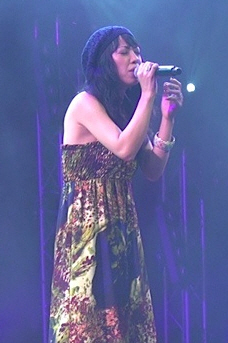Yoko Moriguchi is a Japanese actress. She made her film debut with Tora-san Goes Religious? in 1983.
Masumi Itō is a Japanese singer and composer from Ibaraki prefecture in Japan. Itō has composed the soundtracks to many anime television shows and is part of the bands Oranges & Lemons and Heart of Air.
Michiko Yokote is a Japanese screenwriter.
Navel is a Japanese label of Omega Vision Inc. a publisher of bishōjo and eroge visual novel games. Its name is a reference to the navel orange.
Hitomi is a Japanese voice actress from Osaka Prefecture, Japan. She has also done voice work, especially in eroge, under the name Minami Hokuto. She is married to fellow voice actor Kazuya Ichijō.
Yozuca*, stylised in all lowercase, is a Japanese female singer. She performs songs mainly for games and anime and is known especially for her vocal contributions to the Da Capo series. Her debut was in 2002 with the song "Da Capo: dai-2 botan no chikai", used as the theme song for the adult PC game D.C.: Da Capo. She works under Peak A Soul+, and most of her works are released by Lantis.

Aki Misato is a female Japanese J-pop singer from Saitama, Japan. Most of her songs are theme songs for anime and video games. She made her debut in 2004 with her first single Kimi ga Sora Datta (君が空だった), which was featured as the ending theme of the anime Mai-HiME. To date she has released sixteen singles, and in addition has been featured in several compilation albums.

Lia is a Japanese singer and songwriter. Lia recorded "Tori no Uta" for Key's 2000 visual novel Air, which was reused in its 2005 anime adaptation and became influential in popular culture. She additionally recorded two other tracks for the visual novel, which were commercially successful.
Jukki Hanada is a Japanese anime screenwriter and light novelist. His grandfather was essayist and literary critic Kiyoteru Hanada, who also gave him his first name.

Kanako Itō is a female Japanese singer from Utsunomiya, Tochigi, Japan. She has sung a large number of songs that have been used in a variety of video games, visual novels, and anime.
Miyuki Hashimoto is a female Japanese singer from Saitama Prefecture. She is signed to Lantis, a label which contribute songs to anime and video games.
Sora Izumikawa, is a Japanese artist, singer-songwriter, voice actress, composer and producer currently based on Japan. Also Ex-CEO for Dog-Rights Co., Ltd.
Hitoshi Okamoto is a Japanese guitarist, composer, arranger and the former member of the J-pop band Garnet Crow in years 1999 to 2013, as well as some of his own solo releases.
Mayo Okamoto is a Japanese pop singer and songwriter. Her 1995 debut single "Tomorrow" peaked at number 1 on the Oricon weekly single charts. She released her greatest hits album Rise 1 in 2000. The album topped the Oricon weekly album charts.

Lump of Sugar Ltd. is a Japanese company specializing in adult visual novels. Founded in April 2005, their first game, Nursery Rhyme was released later that year. Their third work, Tayutama: Kiss on my Deity, was released in 2008, and was later adapted into an anime and manga.

Cosmos no Sora ni is a Japanese adult visual novel developed by Marron that was released for Windows on July 27, 2001. The story is told from the perspective of Yasuomi Nīzawa, who discovers more about his childhood memories as the high school cultural festival approaches. The gameplay in Cosmos no Sora ni follows a branching plot line which offers pre-determined scenarios with courses of interaction, and focuses on the appeal of the female main characters by the player character.




